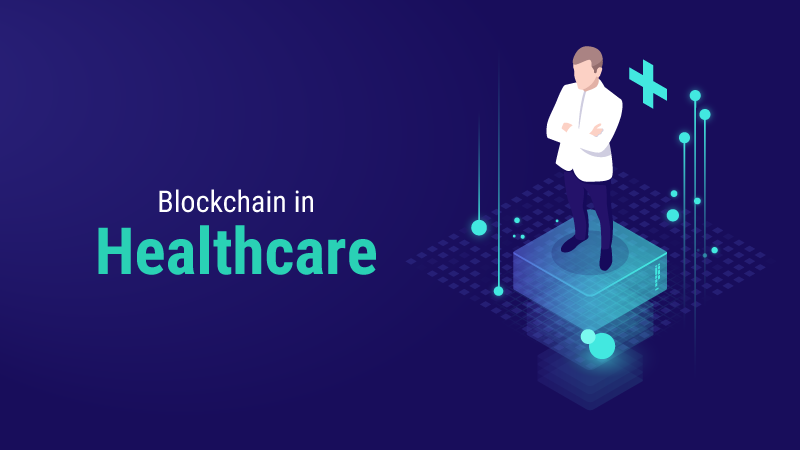Applications of Blockchain Technology in the Healthcare Industry

Developed countries are spending a good portion of their gross domestic product (GDP) on healthcare. Anyhow, this doesn’t stop increasing hospital costs, inefficient practices, and breaches in the health data of patients. This is where blockchain technology can be used to bring changes. Blockchain technology helps in improving performance, security, and transparency while transferring medical data throughout the healthcare system. The application of blockchain also helps in identifying serious and dangerous errors in the medical field. The main reason for the adoption of blockchain technology is its whole digitalized facets and its use in healthcare applications.
Applications of Blockchain in the healthcare industry
Blockchain helps healthcare institutions to gain insight into the functioning of the entire system and improve the analysis of medical records. Eliminating wastage of time and resources while enhancing productivity and increasing workflow is one of the most convenient applications of blockchain in healthcare.
Here are some major use cases of blockchain in the healthcare industry:
Secures patient data
Safety is always a major concern in the health sector. Currently, one of the most popular blockchain applications in healthcare is keeping vital medical data secure. As per reports, around 180 million patient records were revealed in data breaches between 2009 and 2022. Banking information, credit cards, and health and genetic test documents have been stolen by criminals. What makes blockchain a suitable technology for security applications is its capability to keep a record of all patients’ data intact, decentralized, transparent lucid. Although blockchain is transparent, it hides the identity and keeps the privacy of any individual with intricate and secret codes. This technology also enables patients and other healthcare providers to pass the same information securely and rapidly.
Analyze the outcomes of specific procedures
Researchers have given verified access to patient data, which is used to evaluate every specific procedure on a proportionate number of patients. This results in bringing relevant improvements in managing these patient groups. It also gives updates to the clinicians on the patient’s current condition using data collected in real-time, notifies them of any emergencies, and provides exactly prescribed drugs or services for patients. They can also deliver effective advice to patients regarding the use of medication based on the outcomes.
Avoids dangerous and costly mistakes
Lack of proper communication between medical professionals may result in a loss of $ 11 billion a year in the healthcare sector. Most importantly, it is even dangerous to the health of patients. Error-prone medical records or delayed addition of updates to the record are the major reasons for improper communication. Also, gaining access to the medical records of a patient is a process that takes a lot of time, wears out staff resources, and slows down patient care.
Blockchain-based medical records are the best alternatives for these ailments. Since blockchain solutions are decentralized, information is scattered across multiple network nodes, instead of being stored in a single database. Any change made to the information in a node will be updated automatically in all the network nodes. This results in the efficient exchange of up-to-date information with any doctor or health care provider. This type of technology creates a database of patients, that allows healthcare providers, hospitals, and pharmacists to refer to anyone else involved in treatment. This way, the blockchain can help in quick diagnoses and personal care plans.
Supply chain management and drug traceability
There are many questions like how much we are aware of our medicine. Is it possible to confirm that there is no forgery in it? Does it come from a legitimate supplier? – all that becomes the primary concern of the relationship between the medical supply chain or the lab and the market. Blockchain brings serious inferences in the pharmaceutical supply chain management, and its decentralized nature guarantees full lucidity in the shipping process. When a ledger for a drug is generated, it notes the point of origin, which means the laboratory. Until it comes to the customer’s hands, the ledger will then keep recording step-by-step data, like who handled it and where it was. These records bring transparency to the supply chain and enhance the safety of drugs or medical equipment.
Reduce data transformation time and cost
Blockchain networks reduce the time and cost during data conversion. Blockchain networks ensure to address the problem of quick and effective testing of medical credentials along with ensuring the anonymity and privacy of patients. It can also bring out essential new ideas and discoveries that could change the way healthcare functions in the world. The application of blockchain facilitates the transfer of monetary data while respecting the value and privacy of the data. Blockchain technology also enables you to save transaction history and documentation along with time stamping. Every node in this network is checked and recorded for each data input.
Breakthroughs in genomics
The possibility of genetics making vast changes in the future of human health was a dream once and is now a scientific and economic reality. Back in 2001, $ 1 billion was the cost incurred to process a human genome but it takes $ 1,000 and some proficient companies to bring DNA tests that can open doors to our past and future health. Blockchain is perfectly suited for the growth of genomics as it can securely store a lot of genetic data points. It has even helped people to share encrypted genetic information to create a vast database. This, in fact, gives researchers access to relevant data more quickly than ever before.
Wrap Up
When it comes to health care, the need for development is accelerating at an even more incredible pace. What is needed today are quality healthcare facilities supported by modern and innovative technologies. Here, we have discussed some of the best ways through which blockchain plays a crucial role in transforming the healthcare sector.
Get Started with our Blockchain Consulting Services